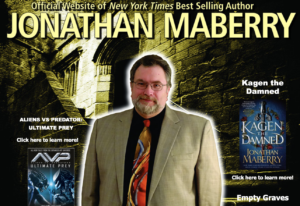Writer Jonathan Maberry & his horrifying F… word!
It happened at the San Francisco Writers’ Conference in February. It happened early in the morning, at the keynote speech, when Mr. Maberry was called in to be the Famous Writer for the morning and say Famous things about Writing.
What happened? Mr. Maberry, bestselling author, used the F… word.
Yes, I heard him myself, and I was so astonished I had to wait until I heard it a couple more times. Then I’d have the confidence to write it down. Here is what he said,..
… when we write, … we should have…
“FUN!”
Fun? What? Why, yes that’s what he said: Fun. Have you ever heard of any such thing?
In all your classes, and all the LitCrit analysis to find the “right” way to write and to avoid the “wrong” way and the Real Meaning Hidden but Cleverly Revealed by Anointed Critics — In all of this, has anyone ever mentioned that writing might be…f….f…f.. fun?
And he compounded his apostasy by including the L word:
“Write out of Love.”
He must have felt emboldened to proceed, because there were no Famous Professors standing up to heckle him. (“The Canon! The Canon! Western Civilization! Closing minds!)
In choosing an agent: “Look for good folks so you can have fun together.”
“Agents want a book they fall in love with. Look for good will, not negativity.”
- Write in different genres. “Someone comes and asks you to write a YA book, say Yes! And Then find the fun way towrite it.”
- Someone asks you to write a comic, say Yes!
At one point, he agreed to write Hallmark cards. Yes! Why not?
This is a direct attack on the academic literature industry, because if students starting having fun in class, how much of the modern LitCrit establishment would collapse?
If negativity would be banned, what would happen to the library shelves loaded with all that Literary Criticism?
In my early 20s, I sat in a Hemingway class and asked if we could read the “Green Hills of Africa” because Hemingway was trying to see if nonfiction had the same power as fiction.
“That’s just not a very interesting question,” the professor sniffed.
So I went into journalism, where I could specialize the the “not very interesting” things that were happening in the real world to real people.
If Maberry were there, he might say:
“Great idea! Wouldn’t that be fun? Let’s see what we can learn from comparing the two types! Maybe we’ll learn something new!”
Or when I sat in on a EngLit class at Harvard – they began with Dickens’ Oliver Twist – we were told we had to analyze it through the theories of George Lukas. Nothing could be more designed to kill the spirit of Dickens and banish any form of fun from the classroom.
The whole idea of fun would spread like a virus and infect all the gray dark corners of deconstructionism, post-modernism and pseudo-philosophical neo-nihilist Freudian Marxist analytics that passes as modern literature studies and we might even get back to reading stories we enjoy.
How many magazines would close and how many stories would be left unpublished if students went on strike and insisted on F(un) and L(ove) in W(riting)!
‹ ◊ ›
